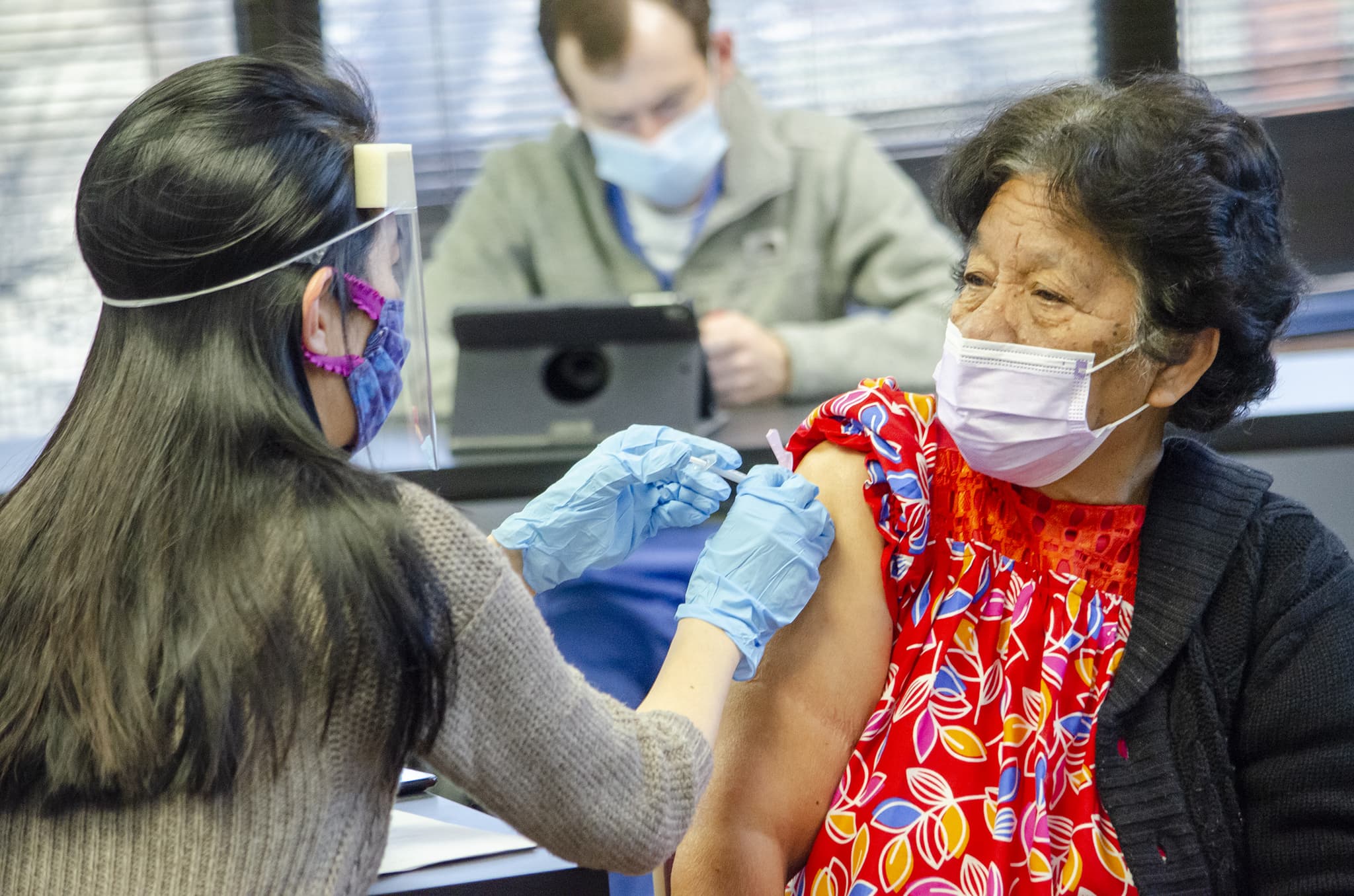View Larger Image

A Marshallese resident in Northwest Arkansas receives a COVID-19 vaccine.
UAMS Researchers Find High Willingness Among Marshallese, Hispanics to Get a COVID-19 Booster Shot
| FAYETTEVILLE — Marshallese and Hispanic communities in Northwest Arkansas are largely receptive to receiving COVID-19 booster shots if advised by a health care provider, according to a study conducted by researchers at the University of Arkansas for Medical Sciences (UAMS) Office of Community Health & Research.
The COVID-19 pandemic affected Marshallese and Hispanic communities in Northwest Arkansas at such a high rate that the Centers for Disease Control and Prevention (CDC) visited the area in the summer of 2020 to investigate the causes of infection among those populations and barriers to safe quarantine. During the height of the pandemic, the Marshallese and Hispanic populations made up 64% of local COVID-19 cases, while only accounting for about 20% of the region’s population. According to data from the National Institutes of Health, Marshallese populations also suffered a death rate due to COVID-19 of about 93 times higher than Caucasians.
Marshallese and Hispanic community members experienced several barriers to vaccination, including language, access to vaccine sites and limited transportation, according to both CDC- and NIH-funded research. The lack of access to vaccine sites prompted UAMS Office of Community Health & Research and local organizations to host culturally appropriate vaccine events with bilingual community health workers (CHWs) at various community locations — such as churches, community centers and job sites — where participants felt more comfortable.
Study participants said they were willing to get booster shots yearly, as they do for the flu, if health care providers recommended it.
“Just like the flu shot, in years to come, if COVID vaccinations are available yearly, then I’ll take it to better protect ourselves,” one participant stated.
Participants also reported they would prefer to receive booster shots at community locations where vaccine events had been held previously and with familiar CHWs who provided culturally appropriate vaccine information and guidance.
“I [will] go there and get [a vaccine] again because I felt really comfortable as if I were at home,” one participant explained. “I was at ease.”
“Currently, about 11% of Arkansas’ population has received an updated booster shot, so it’s important to continue to build trust with members of the Marshallese and Hispanic communities,” said Rachel Purvis, an assistant professor in the Office of Community Health & Research. “Building trust reduces fear and encourages vaccination, but also highlights the importance of community engagement to address the gaps in health care access.”
The COVID-19 booster shots are proven safe and effective in preventing the spread of the virus. The CDC recommends everyone 6 years and older receive a booster shot regardless of original COVID-19 vaccine status. UAMS Community Health & Research offers free health screenings, COVID-19 vaccines and boosters at mobile health events throughout Northwest Arkansas. For more information or to view the schedule of upcoming mobile health events, visit nwa.uams.edu/chr/mobile-health.
The study, Factors Associated with Marshallese and Hispanic Adults’ Willingness to Receive a COVID-19 Booster Dose, was published by SageJournals.
The UAMS Northwest Regional Campus includes 329 medical, pharmacy, nursing and health professions students, 66 medical and pharmacy residents, and two sports medicine fellows. The campus has nine clinics including a student-led clinic, orthopaedics and sports medicine, and physical, occupational and speech therapy. Faculty conduct research to reduce health disparities.
UAMS is the state’s only health sciences university, with colleges of Medicine, Nursing, Pharmacy, Health Professions and Public Health; a graduate school; a hospital; a main campus in Little Rock; a Northwest Arkansas regional campus in Fayetteville; a statewide network of regional campuses; and seven institutes: the Winthrop P. Rockefeller Cancer Institute, Jackson T. Stephens Spine & Neurosciences Institute, Harvey & Bernice Jones Eye Institute, Psychiatric Research Institute, Donald W. Reynolds Institute on Aging, Translational Research Institute and Institute for Digital Health & Innovation. UAMS includes UAMS Health, a statewide health system that encompasses all of UAMS’ clinical enterprise. UAMS is the only adult Level 1 trauma center in the state. UAMS has 3,240 students, 913 medical residents and fellows, and five dental residents. It is the state’s largest public employer with more than 11,000 employees, including 1,200 physicians who provide care to patients at UAMS, its regional campuses, Arkansas Children’s, the VA Medical Center and Baptist Health. Visit www.uams.edu or www.uamshealth.com. Find us on Facebook, Twitter, YouTube or Instagram.